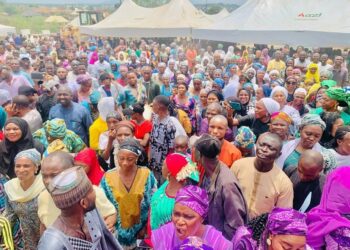Nigerians have continued to react to last Tuesday’s directive by President Muhammadu Buhari to the Central Bank of Nigeria (CBN) to halt further provision of foreign exchange for the importation of food items into the country.
According to his spokesperson, Garba Shehu, the directive became necessary after the president said his administration has achieved food security.
“Don’t give a cent to anybody to import food into the country,’’ the president was quoted as saying while hosting the All Progressives Congress (APC) governors to Eid-el-Kabir lunch in his country home in Daura, Katsina State.

But, various individuals and groups have either criticised the directive as draconian and unconstitutional, while others have hailed it as a step in the right direction to boost economic growth.
Others said although the policy may be a positive step, government and all interest groups should pursue it with caution to avoid a negative backlash.
Moghalu
The former deputy governor of the CBN, Kingsley Moghalu, said in a series of tweets via his Twitter handle, @MoghaluKingsley, the directive will result in a negative outcome to the economy.
“The implication of this draconian order is that importers will go to the parallel market to purchase dollar and in turn increase dollar value to Naira, and at the end put pressure on our reserve and Naira,” Mr Moghalu said.
The presidential candidate of the Young Progressives Party (YPP) in the 2019 presidential elections said the government should rather make the country’s agriculture competitive and import will fizzle out.
Urging the president to allow the CBN to discharge its mandate independently within the ambit of the CBN Act, and stop subjecting it to such directives, Mr Moghalu said the apex bank should assert its independence.
According to him, the entire Nigerian economy appears to have been “sub-contracted” to the CBN, including industrial and trade policies, resulting in the economy faring poorly, and the bank losing its independence.
To create a level playing field for all players, the CBN deputy governor said the country’s marketplace should be regulated and guided in a rational manner.
“Our economy will not be saved by ad hoc political decisions like this (directive on FOREX) handed down by the very institutions that should be shielded from the whim and caprices of politicians.
“The issue here isn’t whether or not CBN should allow access to FOREX for food imports. It is about whether such an economic policy of a Central Bank should be imposed by a political authority. A major reason for our poverty, instability and weak economy is weak institutions,” he said.
MAN calls for cooperation
The President of the Manufacturers Association of Nigeria (MAN), Mansur Ahmed, thinks differently. He told PREMIUM TIMES, there was nothing new about the directive.
Hhe said the CBN’s objective was part of the overall government intention on the economy. Therefore, there should be mutual cooperation and collaboration in policy execution, by aligning policies to realities in the society.
According to Mr Ahmed, since its coming, the administration has always talked about backward integration and significant reduction of imports of items that can be produced locally in the economy.
Although he said the directive should be pursued carefully and well-considered in implementation, he added that the policy remained one of the ways to diversify the economy and bring more local inputs to the production process.
“Each value chain has to be involved in the process towards backward integration. Each value chain should sit down with government to articulate and agree on how this will be realised.
“Because it will ultimately lead to local investments, which do not come overnight, there should be sufficient consultation between regulators and operators. It is the interest of the country to diversify and find a way to increase our national reserves,” he said.
‘Policy requires care’
For the CEO of Global Analytics Consulting Limited, Tope Fasua, his sympathy for the president’s directive is measured carefully against the likely impact it will create on the economy.
The presidential candidate of the Abundant Nigeria Renewal Party (ANRP) in the 2019 elections said his support for the directive for CBN to restrict FOREX for imports of food items into the country was to the point of how it affected milk.
However, he said the situation is assuming a more serious dimension with the president’s latest directive on all food items.
“Here, one has to be careful to ensure it does not impact the economy more negatively,” he said.
“I am of the view that we should produce anything we can on our own. But, the timing and implementation of the policy also matters. It will have a far-reaching implication.
“Already the private sector has been complaining about the restriction of FOREX to 43 items. It might lead to a rise in prices if one has to recover the cost of sourcing for FOREX to bring in what people need.”
Background
On June 23, 2015, a notice from the CBN’s Trade and Exchange Department to the general public and authorised FOREX dealers listed some 41 imported goods and services that were included on the list of items considered not valid for FOREX in the Nigerian FOREX market.
Among the items were food items like rice, margarine, palm kernel/palm oil products/vegetable oils, meat and processed meat products, vegetables and processed vegetable products, poultry (chicken, eggs, and turkey), tinned fish in sauce/sardines, tomatoes/tomato pastes.
More items barred
By December 2018, the CBN announced the addition to the list of two items, namely textile materials/garment and fertilizer.
Early this year, the CBN Governor, Godwin Emefiele, said during an inspection visit to refinery Dangote Refinery project at the Lekki Free Trade Zone in Lagos that government was spending close to 55 or 60 percent of its FOREX on importation of food items.
Mr Emefiele the CBN FOREX restriction policy was central to its effort to achieve exchange rate stability, boost local production and reduce unemployment in the country.
“Importers who may want to continue importing these goods would have to sort their foreign exchange from their own private sources,” he said.
At the end of the Monetary Policy Committee meeting for last July, Mr Emefiele said the CBN was considering adding milk as the 44th item to the list of items to be restricted from accessing FOREX for importation.
Mr Emefiele said the era of restriction of FOREX for milk importation was in sight after waiting for more than three years for importer of the food item to find ways to embrace integration by way of local milk production.








